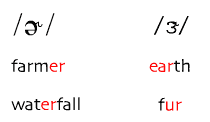I'm confused about the difference in pronouncing "er" in words such as "farmer" and "earth". I hear them the same, but they have different phonetic symbols. Is there any difference in pronouncing "er" in these words?
example:

I'm confused about the difference in pronouncing "er" in words such as "farmer" and "earth". I hear them the same, but they have different phonetic symbols. Is there any difference in pronouncing "er" in these words?
example:

Yet another edit: The schwa symbols reported in your image are slightly different from the one I know and the reason is that they denote the Rhotic version of the schwa sound, especially present in American English. The symbol is ɚ and it appears in words such as better. This is not the only variant but it was the one related to your question.
They are both schwa sounds.
The phonological difference between them is that this one ə is a normal schwa, while this one ɜ: is a long schwa. So the sound is the same, it's just a bit longer.
Now: it's also true that, in everyday life, people won't pay attention to that and some might pronounce it wrong. But I wanted to let you know the basic difference in terms of Phonology.
EDIT: Look, this is the Phonemic Chart provided by the BBC. Look at the vowels section and click the two symbols (ə and ɜ:) in the "middle" of that tab-like thing.
This is specifically British English, but it will give you the idea of what I meant.
In many dialects of American English, there is no difference between these two words except perhaps a slight difference in length, which is not especially significant.
The phonetic rendering that you're looking at is probably slanted towards a British accent. In British English, the /r/ sound is usually not pronounced as a separate segment at the end of a syllable, but rather causes a slight change in the preceding vowel. This is indicated by the symbols that you see, which is called an "r-colored schwa".
Most American English dialects, however, do not have an r-colored schwa in this position. Instead, they have a syllabic r, which is formed by putting your tongue in the position for the /r/ sound and simply holding it, with no real vowel sound at all. I pronounce the word farmer as [farmr̩] (where the small vertical line below the /r/ indicates a syllabic consonant), and I pronounce earth as [r̩:θ] (the colon indicates that the /r/ sound is longer). This pronunciation is typical of general American Midwest accents.
In British and American English, the sound of the letters highlighted in red is generally /ə/; what changes is the pronunciation of the r, which may alter the pronunciation of the preceding vowel, such as in /əːθ/ where the /əː/ sound is longer than the /ə/ sound (that is the meaning of ː placed after ə).
Word | American English | British English ----------------------------------------------------------- earth | ərθ | əːθ farmer | ˈfɑrmər | ˈfɑːmə fur | fər | fəː waterfall | ˈwɔdərˌfɔl ˈwɑdərˌfɔl | ˈwɔːtəfɔːl
The er sound in farmer and waterfall has a slightly weaker r and thus is slightly more like 'uh' than the er sound in earth and fur. It is a very slight difference that's often not even noticeable.
You can test it by replacing the er with an actual uh sound. In farmer and waterfall it will sound strange, like a speech impediment. In earth and fur, it will be completely bizarre and sound like a different word entirely.